Pepper is a common seasoning that is often a subject of questioning among the cooks; Sometimes they ask themselves why black pepper is always used, while at other times, white pepper is the choice. Both belong to the same plant – Piper nigrum—but their processing and flavor profiles separate them remarkably. Besides, both peppers have their own health benefits that are hard to believe, mainly in digestion, immunity, and metabolism.
Let us get to the bottom of the matter regarding the difference between black pepper and white pepper, and discover which one is really the winner in becoming a regular member in your spice rack.
The Basic Difference: How Each Pepper Is Made
How the two peppers are made is the most basic and prominent difference that exists between them.
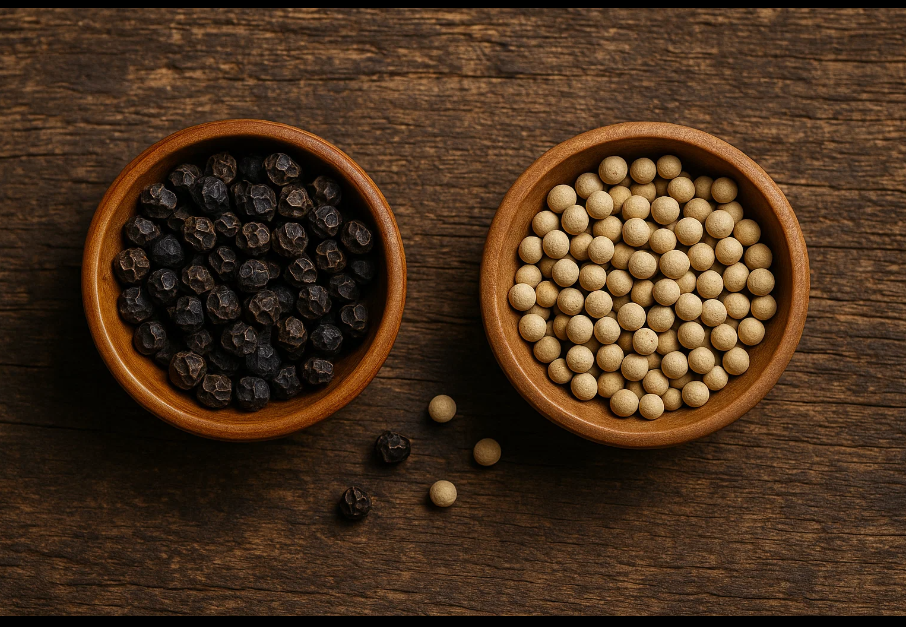
Black Pepper: Unripe green berries are picked and dried under the sun to turn black and shriveled. This drying method preserves the whole outer layer of the peppercorns, giving black pepper its defining strong smell and impudent rich taste.
White Pepper: White pepper comes from fully ripe red berries and is made by soaking the berries in water to take off the seed coat. The soft and light-colored immature seed that is left produces a less sharp and more earthy flavor.
In a nutshell:
➡️ Black pepper = whole dried immature berry.
➡️ White pepper = peeled ripe seed.
The processing methods make the two peppers different in color and also affect the flavor to some extent.
2. Flavor and Culinary Uses
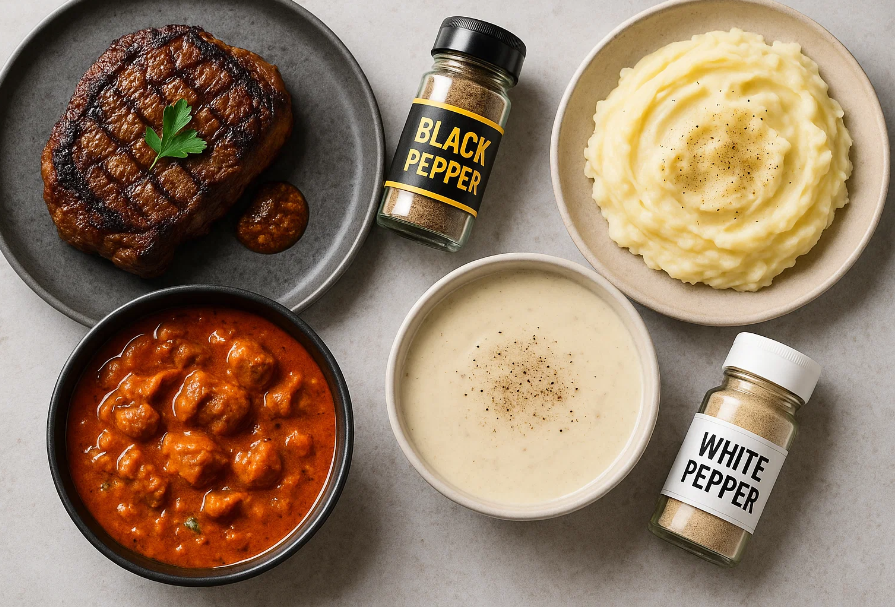
The moment you taste both of them, you are already aware of the difference.
Black pepper presents a more potent and less pleasant flavor — excellent for making-up hearty dishes, marinades, grilling, and curry-related dishes. It not only adds a spicy warmth but also a visual depth.
Conversely, white pepper is not so strong that it will not undergo the moult of assimilating the light-colored dishes at the end of the cooking process — in the case of soups, sauces, mashed potatoes, and fish, especially where you do not want black dots to appear at all.
Pro Tip: Use black pepper for strong Indian or Western cuisine and white pepper for smooth or tender dishes like French and Chinese cooking.
3. Comparing the Health Benefits
Both types of pepper are rich in piperine, a bioactive compound responsible for their spiciness and many of their health benefits. However, black pepper generally contains a higher concentration of it.
| Health Benefit | Black Pepper | White Pepper |
|---|---|---|
| Antioxidant & Anti-inflammatory | More piperine means a super antioxidant and natural anti-inflammatory agent. | Still, with less active antioxidant activity. |
| Nutrient Absorption | Superb absorption of curcumin, selenium, and B vitamins. | Helps, but not as effectively because of lower piperine. |
| Digestive Health | Acts like a drug that speeds up digestion and keeps intestines healthy while reducing bloating. | Also makes digestion and appetite more active, which is a great help in soups and light meals. |
| Weight Management | May boost metabolism and promote fat breakdown. | Similar effects, but less noticeable. |
| Detox Support | Helps the liver function better and eliminates toxins more effectively. | Supports the cleansing process but with less potency. |
4. Why Black Pepper Is Slightly Healthier
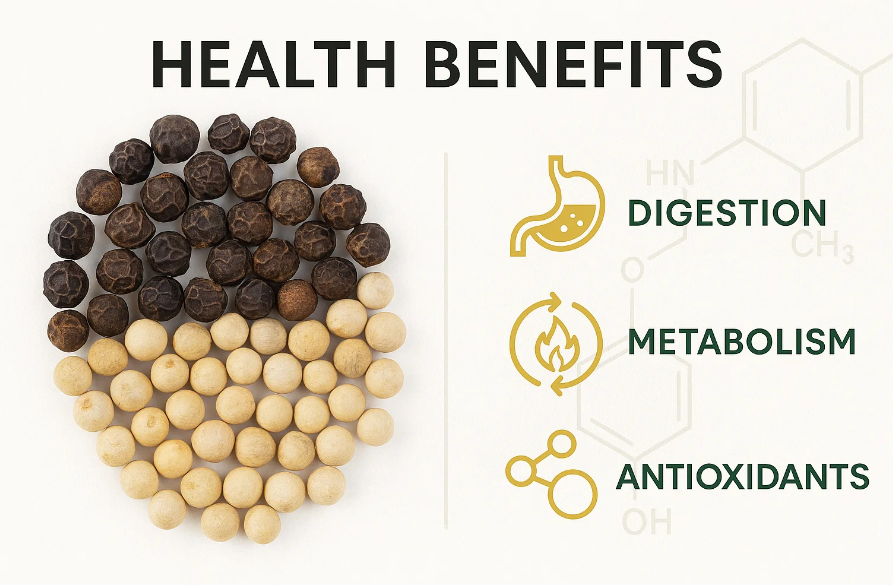
The advantage of black pepper is its piperine content that is higher than that of white pepper. Piperine has the added benefit of providing the following benefits beyond the flavor of spice and heat:
- Increases the absorption of all nutrients, especially curcumin from turmeric.
- Functions as a natural remedy for pain and inflammation.
- Enhances metabolism, which could help with fat loss.
- Benefits brain health and function.
That said, you should not overlook white pepper. It is easier on the digestive system, less pungent in aroma, and the perfect pepper for someone who prefers less spice – especially in a soup or creamy dish.
5. Which One Should You Choose?

The following is a summary to help inform your decision:
👉Choose Black Pepper if you/you are cooking/dealing with:
- Want a stronger flavor & aroma.
- Are working with dark sauces, meats, and Indian dishes.
- Want to get the most piperine health benefits.
👉Choose White Pepper if you/you are cooking/dealing with:
- Are cooking with light-colored foods (soups, mashed potatoes, white sauces).
- Want milder, smoother spice notes.
- Have a sensitive palate or stomach.
At the end of the day, both are beneficial and interchangeable as you are preparing each dish. Keeping both in your kitchen will prepare you for any specialty dish.
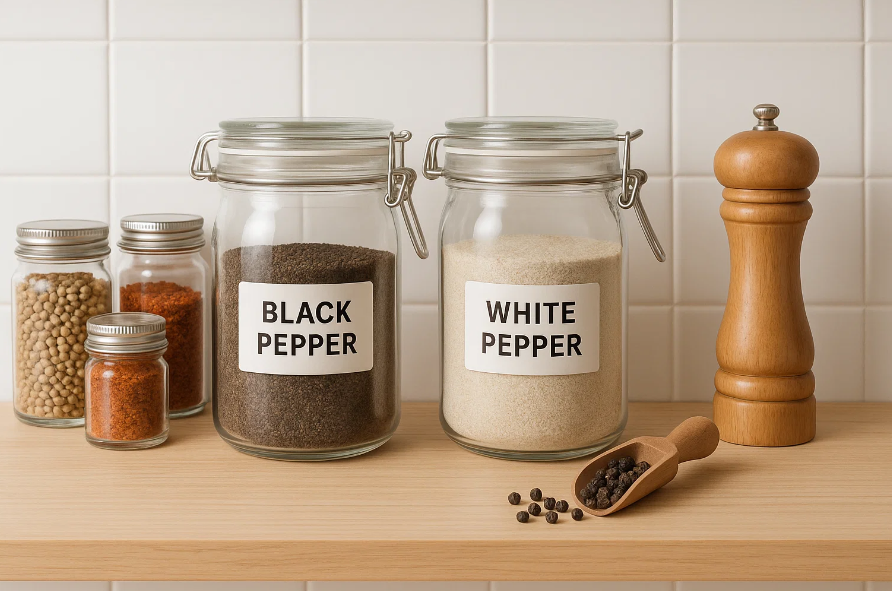
How to Store and Use for Maximum Freshness
- Storage and Use During Maximum Freshness.
- In order to get the most flavor and potency:
- Keep the peppercorns in a tightly closed glass jar in the absence of heat and light.
- Prepare the ground only as much as you have to, freshly ground pepper always goes down better.
Use black and white pepper (in equal portions) to form a balanced blend of pepper that can be used in virtually any dish.
Final Thoughts
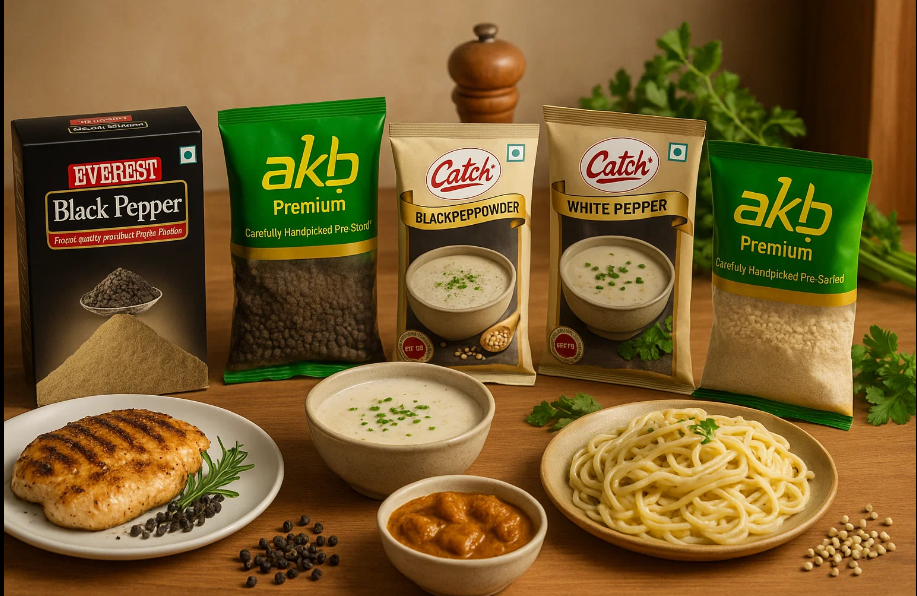
In the case of black pepper vs white pepper, there are differences in the strengths of each. Black pepper is the best as it is full-flavored and slightly healthier, and white pepper is the best in the dishes that require delicacy and sophistication.
After all, the most healthy option is to combine both of them and enjoy the difference as well as enjoy the mutual nutritional value. One spoonful of either one can turn your food and improve your health in a natural way.
That is why next time you are cooking a soup or putting some spices in your curry, keep this in mind: each small pinch of pepper contributes not only flavor, but health as well.



It’s interesting to learn that black pepper retains the outer layer, which seems to explain its sharper, more pungent flavor. I’m curious if the processing method impacts the nutritional value, though—does the removal of the outer layer in white pepper affect its health benefits in any significant way?